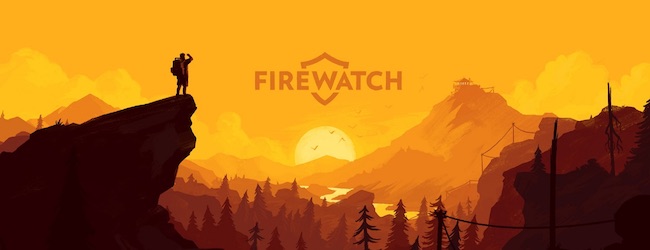
Hunkering down last week to play Firewatch, it dawned on me that for the first time in a while I was walking into a game with little to no knowledge of what it was actually about. While initially being enticed by the beautiful promotional art, the official word on the game was kept pretty well under wraps. Whether you may agree with me or not, sometimes I feel that instinct can play an integral part in the indie gaming scene – a game just feels and/or looks like it’s going to be the right fit for you. Thankfully, I was right about my gut reaction to Firewatch.
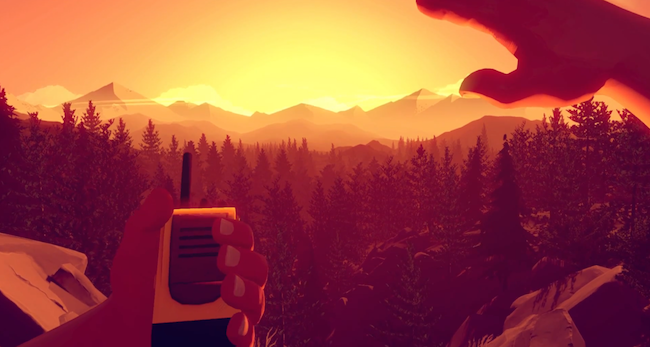
Set in 1988 (the year of my birth!), you are dropped in the shoes of Henry – a pretty average Joe of a guy who takes a job as a fire lookout during the summer. With only his supervisor Delilah as a point of contact, a relationship forms through the events that unfold in the Shoshone National Forest and the lives that they left behind. At the core of Firewatch, the narrative takes an admirable shot at trying to capture the human condition when faced with moments of fear, desperation and isolation while also dealing with more mature subject matters. In a similar vein to recent games such as Gone Home and That Dragon, Cancer – it is incredibly moving to see video games develop as a medium and begin to explore issues which are close to the hearts of many people around the world.
The depth of which the game explores the inner psyche of Henry is kept through his writing over the course of the summer in conjunction with the experiences that are unfolding before him, helping to ground the whole experience in a realistic fashion. While doing some research on the basis of the game, I learned that it heavily draws upon the Yellowstone National Park fires which took place in the United States during 1988. I’ve always liked games that borrow some basis from history, so it was interesting to learn where some of the foundation of the story had originated.
I also appreciated the way in which the narrative was staggered through interactions with the environment around you, and personally, it felt to me that the interactions between the two protagonists seemed far more natural in building an authentic relationship. From mundane issues such as a sign having fallen somewhere in the forest to far bigger problems, Henry and Delilah continually play off one another in a game which offers a sense of both sadness and joy in such an interchanging fashion as to capture the true nature of how quickly people’s emotions can truly change.
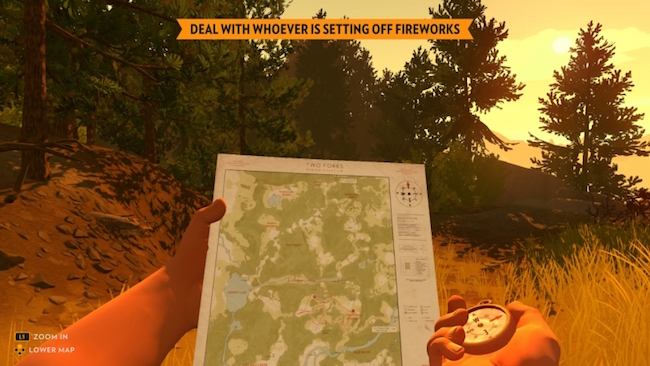
Another feature of Firewatch, that I appreciated, was how the explorable world slowly opened up to you, meaning that despite the game being limited in scope, it helped in making the expanse feel endless. Coupled with the ability to interact with your surrounds such as rappelling down cliff faces and climbing rubble mounds amongst others, the game lends itself to the feeling of adventure and discovery that it aims to create while keeping the mechanics simplistic to maintain the focus on the narrative. In saying this, the dialogue system in Firewatch is much akin to that of Telltale Games which can easily be attributed to the influence of Campo Santo writer and director, Jake Rodkin and Sean Vanaman, who served as the lead creatives on The Walking Dead. Much the same as a Telltale game, the dialogue options that you choose will alter the tone of the relationship between Henry and Delilah, which is a great feature in order to keep the game feeling fresh.
In what I argue is probably the weakest point of the entire game is the gameplay. Although I did play an early release copy of the game, I ran into a couple of issues which have been documented from players who adopted the game at release. The bigger of the two is the games optimisation on all platforms, which initially hasn’t been great – especially for PC users. While I played Firewatch on the PS4, I still experienced some times where the game lagged or I had screen tear. This is an issue which is prevalent in so many current generation games, and is a bit disappointing to see as a trend when these issues should be caught in the beta stages before release. However, to the developer’s credit, word spread quickly that a post-release patch was on its way which would iron out some the performance issues that players were experiencing.
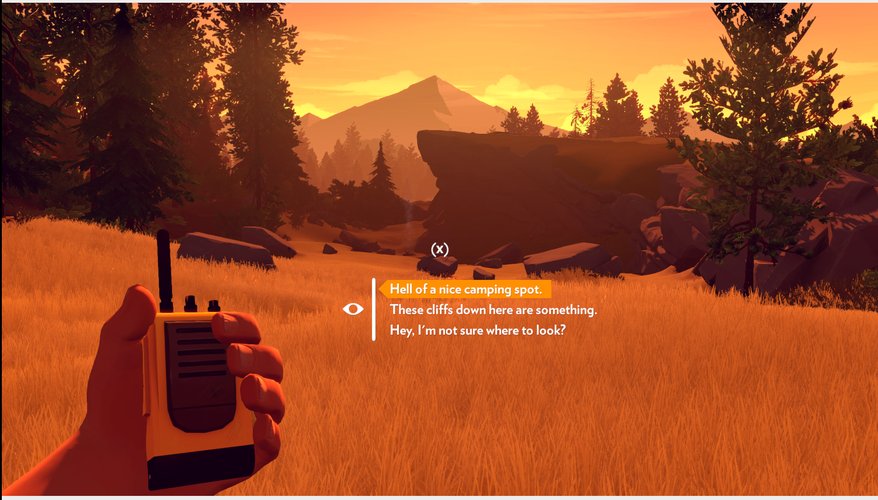
I also was victim to some instances of clipping into the environment, such as getting stuck in mountains that required me to exit out of the game to the main menu and reload. As my only gripes about the game, hopefully, these issues are also resolved with the incoming larger patch for late adopters. In saying this, however, I would like to conclude from my own experience, that despite the graphical issues I encountered, it didn’t take away from my immersion of the game and was easy to overlook due to the gripping nature of the game.
Despite the optimization not being the greatest, I do have to applaud the artistic stylings of Olly Moss and Jane Ng who served as the artists on Firewatch – the game is beautiful to look at in its hyper vibrant realism, and was a real treat to marvel at on the Unity engine. Despite this becoming a common trend on current generation games, I can’t help but continue to be blown away by some of the beautiful art that’s coming out of this industry right now. This also helped lay the foundation for some great voice acting, with my particular favourite being Rich Sommer as Henry, who I’ve followed through his work on Mad Men and the Netflix TV revival of cult-comedy movie, Wet Hot American Summer.
Having honed his craft on high profile TV shows, Sommer plays off Delilah (voiced by newcomer Cissy Jones) with such wit and range that I hope to see him continue to provide voice work for future games. Rounding out the experience is the soundtrack, which strikes all the right chords with someone like myself who appreciates a good piece of media with appropriate accompaniment. Using minimalistic music to direct the emotion of the characters, composer Chris Remo who has worked extensively with Double Fine Productions and the former Gone Home, craftily weaved his touch through the vision of the creative team and delivered a great soundscape for Firewatch.
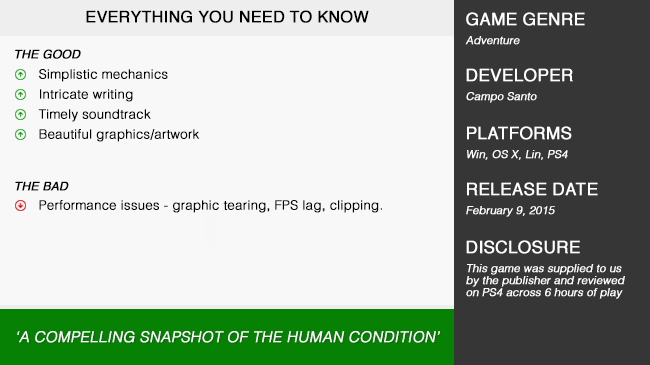
While suffering from some technical issues during its release, Firewatch was undoubtedly a successful debut for Campo Santo into the “walking simulator” genre and gaming industry at large. Despite the steady increase of games being released into the genre, such as Cradle and Everybody’s Gone to the Rapture amongst a score of others – Firewatch manages to distinguish itself from the pack and stand out amongst its peers through the dedicated work of a collaborative artistic vision. With simplistic mechanics, beautiful graphics, timely composition and thoughtful writing being just a few of its selling points – Firewatch was a welcomed surprise that I feel grateful for having played and proud to have trusted my initial instinct.











